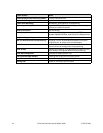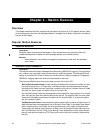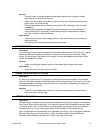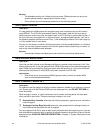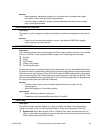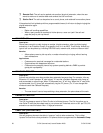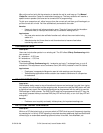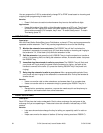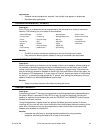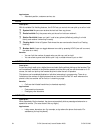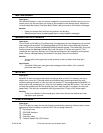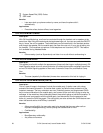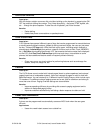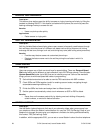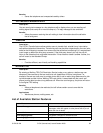
52 S-ICX (International) issued October 2000 S-ICX-50-200
You can program the S-ICX to automatically change DP to DTMF tones based on incoming and
outgoing timer programming for each trunk.
Benefits:
• Doesn’t limit users to certain trunks whenever they have to dial additional digits.
Applications:
• Users dialing into a Voice Mail or Auto-Attendant system on a DP trunk. They’ll need
to switch to DTMF signaling to select Voice Mail options by dialing numbers on the
phone when prompted. (For example, they’ll hear: “To reach Sales, press 1. To reach
Purchasing, press 2.”)
DSS/BLF KEYS
Description:
With the Direct Station Select/Busy Lamp Field feature, a phone’s FF-key can be programmed to
represent another extension. The FF-key can be programmed to do one of the following:
❣ Monitor the extension’s current status. The DSS/BLF key will be lit red when the
extension it represents is currently busy. It’ll flash when there’s an incoming call ringing to
that extension. Or, it’ll be blank (unlit) while the extension is idle.
❣ Call the extension. Just press the (unlit) DSS/BLF key to ring the extension or transfer a
call to it. No pressing Hold, no dialing the extension number, no transfer codes. Just press
the DSS/BLF key.
❣ Immediate-ring the extension’s calls to your phone. The DSS/BLF key will flash and
your phone will ring at exactly the same time the extension is ringing. Just pick up the
handset to connect to the caller. (Or, press the flashing DSS/BLF key if the phone isn’t
ringing.)
❣ Delay-ring the extension’s calls to your phone. After a programmable period of time,
your phone will start ringing for the extension’s unanswered calls. Pick up the handset to
answer the call.
Benefits:
• Users can monitor calls to other extensions, and answer them if no one else does.
• Users can transfer calls to an extension simply by pressing the DSS/BLF key for it.
Applications:
• Receptionists, secretaries, operators—anyone who needs a quick and simple way to
get calls to, and receive them from, other extensions
DUAL-COLOR LEDS
Description:
Each LED key has dual colors underneath. Red is a busy exchange line and green is the
exchange line you are speaking on. These dual colors are utilized to indicate busy or DND
stations.
Benefits:
• Lets users know what exchange line they’re talking on; especially useful for calls on
hold.
• Helps users monitor the status of stations (if the key is being used as a DSS/BLF).



